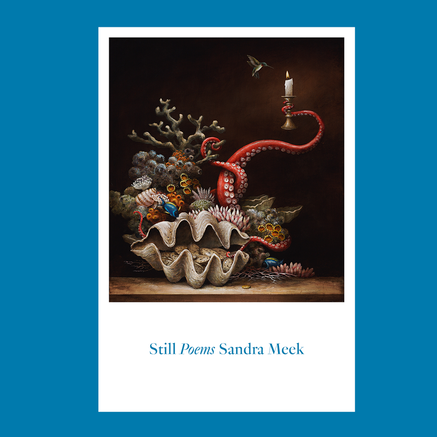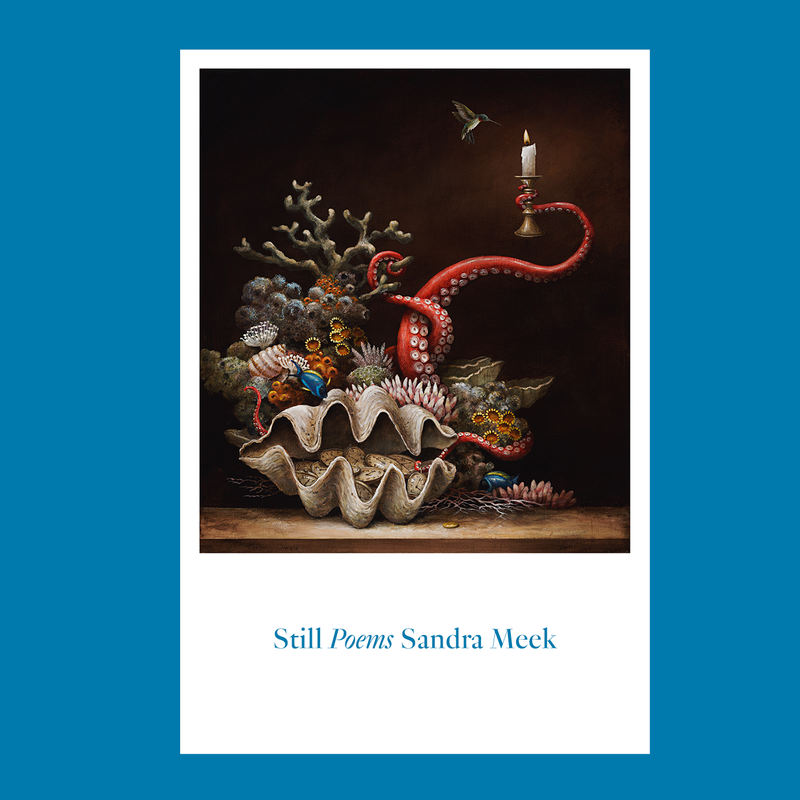NAMED A "NEW & NOTEWORTHY POETRY BOOK"
BY THE NEW YORK TIMES BOOK REVIEW
NAMED A "TOP SPRING POETRY" TITLE
BY LIBRARY JOURNAL
STILL
"Meek’s prescient poetry has long dwelled darkly on humanity’s environmental impact;
in this book, her sixth, the tone has grown urgent, even apocalyptic."
--The New York Times Book Review
"Sandra Meek treats her elegantly crafted poems as still-lifes
displaying the catastrophes of history."
"Absorbing reading."
--Library Journal
INDIEBOUND AMAZON BARNES & NOBLE
About Still:
In her fierce new collection, poet Sandra Meek subverts Renaissance still-life painting in order to illuminate the perhaps irreparable natural and cultural harm inflicted by colonial forces, even those that manage to create a certain beauty from imperial spoils.
Still re-imagines the Renaissance concept of the studiolo, a room displaying cabinets of wonder, each juxtaposing human-made art objects, such as miniature still-life paintings, with natural ones―harbingers of the coming wonders and catastrophes of travel brought back from distant lands Europeans claimed as “discoveries.”
These poems shimmer with the wonders of the natural and aesthetic worlds―and in doing so, reckon with environmental, colonial, and sexual violence, with the oppression of silencing as well as the reclamation of voice. In confronting violations of body, family, culture, and nature, Still gives voice and image not only to what is still, what has been stilled, and what is in danger of being forever stilled, but also to the marvel of survival.
In her fierce new collection, poet Sandra Meek subverts Renaissance still-life painting in order to illuminate the perhaps irreparable natural and cultural harm inflicted by colonial forces, even those that manage to create a certain beauty from imperial spoils.
Still re-imagines the Renaissance concept of the studiolo, a room displaying cabinets of wonder, each juxtaposing human-made art objects, such as miniature still-life paintings, with natural ones―harbingers of the coming wonders and catastrophes of travel brought back from distant lands Europeans claimed as “discoveries.”
These poems shimmer with the wonders of the natural and aesthetic worlds―and in doing so, reckon with environmental, colonial, and sexual violence, with the oppression of silencing as well as the reclamation of voice. In confronting violations of body, family, culture, and nature, Still gives voice and image not only to what is still, what has been stilled, and what is in danger of being forever stilled, but also to the marvel of survival.
Watch:
Launch of Still: Berry College, January 23, 2020: Part 1 (intros, "Still Life with Caribbean Reef Squid," "Still, with Severed Tongue"; Part 2 ("Still Life with White," "Still, with Judas Goats," "Still Life with Evolution"); Part 3 (Q & A)
Listen:
Sandra Meek reads "Still, with Severed Tongue: Cymothoa exigua (Tongue-Eating Isopod) and Lutjanus Guttatus (Spotted Rose Snapper)," from Still
Hear Sandra Meek read more poems from Still
Launch of Still: Berry College, January 23, 2020: Part 1 (intros, "Still Life with Caribbean Reef Squid," "Still, with Severed Tongue"; Part 2 ("Still Life with White," "Still, with Judas Goats," "Still Life with Evolution"); Part 3 (Q & A)
Listen:
Sandra Meek reads "Still, with Severed Tongue: Cymothoa exigua (Tongue-Eating Isopod) and Lutjanus Guttatus (Spotted Rose Snapper)," from Still
Hear Sandra Meek read more poems from Still
Praise for Still:
To stop the beautiful moment—to still it—has been the aim of lyric poetry well since before Goethe and Pushkin. But how can a lyric poet stop time and capture the nature of our world as it is? How can anyone still it? In this collection of still-lives, Sandra Meek gives us 27 answers to these questions. These gorgeous and very smart poems “measure the heart by obsession,” measure our days by music, measure understanding by mysteries. Herein “hindsight is insight // biding its timing.” Herein we learn of our human difficulties and know ourselves by our “quick disappearance.” Herein the “human eye, like a bird’s, can mirror the viewer.” Herein we recognize how our own strangeness mirrors the natural world inside and outside us, how our music is the world’s own hunger for “the flood and the fire, rising.” —Ilya Kaminsky
Sandra Meek is a poet whose work becomes more and more insightful and, given the power we know poetry can have on Earth, more and more necessary. Her latest poems turn from ecology to visual art in ways wholly unexpected. Rather than merely writing poems based on still-lifes, this new work also makes an ekphrasis out of experiences and objects that still (fix in place or time) or are still (lasting, peaceful, static, quiet)—moving from Georgia backyards to Peru in what is now known as Meek’s “deep travel” through time and space. Her books are a cornerstone in the foundation of how we will think about the poems of the early 21st century if we survive much more of the century. I am grateful to have the influence of Still on my own work. —Jericho Brown
Evoking the “cabinet of curiosities” tradition, Meek has placed her objects (in this case, words) so precisely that we see constellations and hear chords—emphasized by her own amazing ear. She knows just how to dissolve sense in sound and, simultaneously, pull sense out of sound, giving meaning new modes of being. —Cole Swenson
To stop the beautiful moment—to still it—has been the aim of lyric poetry well since before Goethe and Pushkin. But how can a lyric poet stop time and capture the nature of our world as it is? How can anyone still it? In this collection of still-lives, Sandra Meek gives us 27 answers to these questions. These gorgeous and very smart poems “measure the heart by obsession,” measure our days by music, measure understanding by mysteries. Herein “hindsight is insight // biding its timing.” Herein we learn of our human difficulties and know ourselves by our “quick disappearance.” Herein the “human eye, like a bird’s, can mirror the viewer.” Herein we recognize how our own strangeness mirrors the natural world inside and outside us, how our music is the world’s own hunger for “the flood and the fire, rising.” —Ilya Kaminsky
Sandra Meek is a poet whose work becomes more and more insightful and, given the power we know poetry can have on Earth, more and more necessary. Her latest poems turn from ecology to visual art in ways wholly unexpected. Rather than merely writing poems based on still-lifes, this new work also makes an ekphrasis out of experiences and objects that still (fix in place or time) or are still (lasting, peaceful, static, quiet)—moving from Georgia backyards to Peru in what is now known as Meek’s “deep travel” through time and space. Her books are a cornerstone in the foundation of how we will think about the poems of the early 21st century if we survive much more of the century. I am grateful to have the influence of Still on my own work. —Jericho Brown
Evoking the “cabinet of curiosities” tradition, Meek has placed her objects (in this case, words) so precisely that we see constellations and hear chords—emphasized by her own amazing ear. She knows just how to dissolve sense in sound and, simultaneously, pull sense out of sound, giving meaning new modes of being. —Cole Swenson


